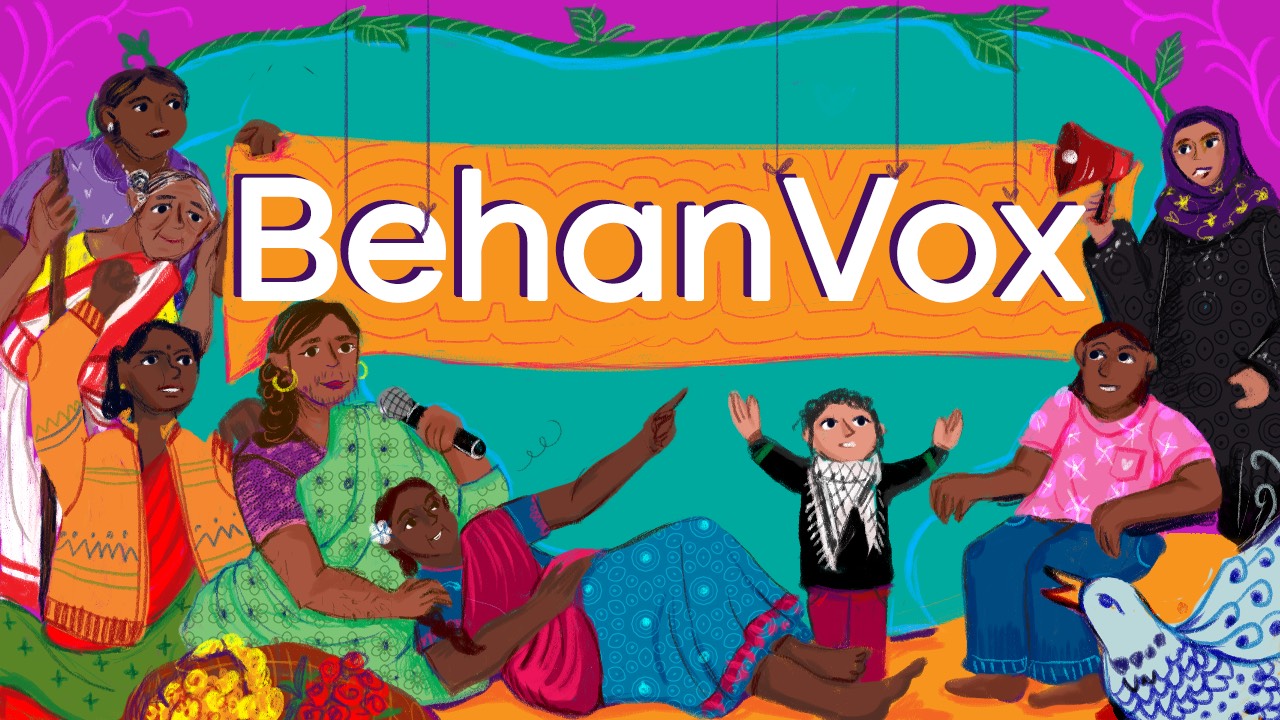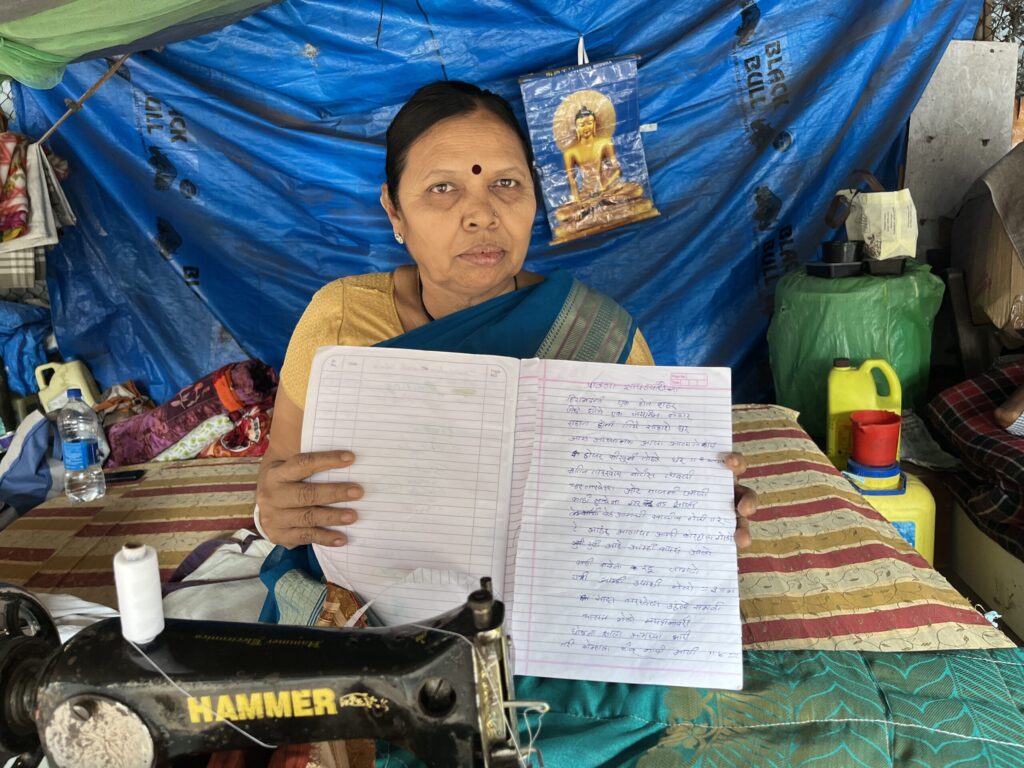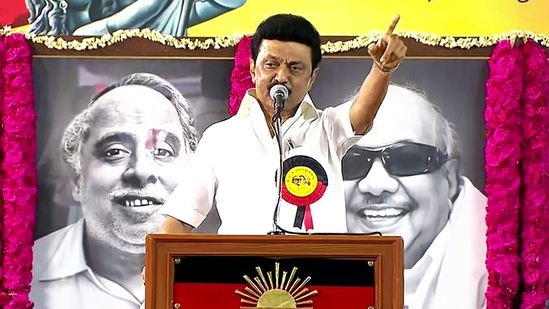BehanVox: When Women Find and Build Hope
This week in BehanVox: life on Powai's footpaths, ASHA workers' ongoing strike, and the politics of hope.

Our weekly newsletter brings you our top stories, gender news from the world, and our team’s reading recommendations.

It has been nearly six months since we met you here, Behanvox reader! This hiatus was necessary for us for several reasons- rest and recovery as well as time to think deeply about a more meaningful news production and consumption process. We imagined a shared space where we could escape the tyranny of the big tech and build a community that is driven by hope, action and change. Now we have not one but an entire bouquet of newsletters that help you make sense of the world with clarity, context and joy.
We are back with BehanVox, our weekly wrap of all the khabar fit to print and more. We have two new newsletters that you will most certainly enjoy reading.
In a return to old times when we looked forward to letters and postcards in mail, Postcards: our monthly newsletter is where we send you missives on the places, people and ideas that brought Team BehanBox joy. Subscribe here. Our other monthly newsletter, Postscript, invites you into our newsroom, where we give you all the BTS on the stories we did and choices we made and those we abandoned. Subscribe here.
But first, some good news. Priyanka Tupe, our reporter based in Maharashtra, whose fantastic body of work uncovers extreme inequality through the most underreported stories of our times, has been awarded the Kamla Mankekar award for gender journalism by The Media Foundation. And that is not all: Saumya Kalia, our other colleague based in Delhi was also among the brilliant nominees for the award. Needless to say, there is all round cheer, celebration and joy in our hood!
In this week’s edition, we bring you a story about women turfed out of their homes by developers, rebuilding their life on footpaths even as they wait for a justice they fear they will never get. And we explain why Tamil Nadu’s contraceptive shortages and its chief ministerial pronouncements are problematic.
Story So Far

Life On Powai’s Footpaths: Among the rag-tag bundle of her spare possessions that Sushila Khandare carries to her workplace – a tarpaulin tent with a sewing machine on a footpath – is her songbook. In a long register, in her neat handwriting she has written palna (cradle) songs, and since hers are sung in the shadow of her old basti that was demolished last year, she calls her collection, Palana Zopadpatticha, or the cradle songs of the shanties.
Sushila used to be among the hundreds of residents who lived in Jai Bhim Nagar, a settlement that sat next to the towering condominiums of the Hiranandani complex – heavily guarded fancy homes where she and other women of the basti worked as domestic workers.
Then in June last year, the corporation declared that it was an illegal basti that was taking up land that was to be used by a developer and that the residents would have to clear out in three days. Then the officials arrived, with police personnel and bulldozers, the demolition left the settlement’s dwellers homeless – about 100 moved to the footpaths and 150 found rented tenements they could ill afford.
The basti has been reduced to rubble, and it remains a vacant plot to this date, cordoned off to the public.
The only thing Sushila’s family could salvage was her precious sewing machine. And that allowed the family to live, albeit on the margins and in acute poverty. Many of the women have lost their jobs as domestic workers, employers are turning them away because they do not have regular homes.
“We have been building these cities for years, don’t we deserve a piece of land to live in? Those who were homeless were criminalised rather than being provided support,” said Meenabai Nimbole.
Sushila and other women are now fighting the long legal battle for their housing rights. And in the meanwhile, they are not giving up on the small joys of life – they are claiming public spaces through cultural interventions. With the help of activists, the women of Jai Bhim Nagar have created a tiny library on the footpath, called Sabki Library. It is little more than a tent with books, presided over by the portrait of Savitribai Phule. She, the women say, will not let them give up the fight for their rights.
Read Priyanka Tupe’s story on how hope survived the trauma of displacement here.

TN’s Family Planning Dilemmas: “Contraception is essential for women to be free and autonomous.” If that sounds like a feminist of our times, think again. That is Dravidar Kazhagam leader EV Ramaswamy or Thanthai Periyar – the father of the Dravidian Movement in Tamil Nadu – from nearly a 100 years ago. Dismantling the idea of chastity, he argued in ‘Why were women enslaved?’ that “pregnancy is especially a cruel enemy to the independence of women”
Tamil Nadu has a long and robust history of engaging with reproductive and sexual health. And it explains why the state has managed its family planning so successfully; so much so that its fertility rate is now in sharp decline. But along with the other southern states, it is now giving the state acute anxiety about being at a disadvantage in the proposed delimitation exercise to fix Lok Sabha seats.
The state’s progressive streak seems to be now threatened if you were to read various conflicting signals from the state in the last few months. For one, chief minister Stalin is exhorting the states’s young married couples to have children as soon as possible.
S Anandhi, professor at Madras Institute of Development, points to more problematic implications. “All of these anxieties are pinned onto women’s reproductive choice and they have a direct implication [for it] and are not to be taken only from the point of view of delimitation,” she says.
But this debate is not all that is problematic about TN’s family planning policies. The absence of a clear directive from the state and lack of awareness among pharmacists – and of course issues of shame and taboo – are creating periodic shortages of emergency contraceptive pills (ECP), popularly known as the morning after pills.
The pill is on the National List of Essential Medicines (NLEM), and per law should be available at all health centres at affordable costs. But as it has been reported, 22 out of 23 pharmacies in Chennai surveyed for an investigative article did not stock it.
Archanaa Sekar is an activist who along with others is trying to ensure that those in desperate need of the pill have access to it. “I have held the hands of young women who have taken the pill in the carpark of my house; there was a woman, mother of two with one child on the autism spectrum, who said I cannot have other children. Another young man emailed me in broken English to ask me where in his remote district where he could find an ECP,” she says.
Read Archita Raghu’s story on why the state needs to be more emphatic about its family planning priorities here.
Talking Point
Domestic Work on Tap: Startup wizards gushed over it as a “game changer”. Analysts drooled over its possibilities for standardising wages in the informal work sector. Launched by Urban Company with the name ‘Insta Maids’, the new service offered domestic work on the tap – 15-minute cleaning, cooking, and mopping services at an introductory rate of Rs 49 per hour to be later bumped up to Rs 150-180. Now renamed Insta Help in the face of a backlash, it still does not sound like an idea that will bring greater dignity to the life of one of the most underpaid and overworked informal work sectors in India which is in desperate need of distinct domestic labour laws, as Behanbox has reported. How exactly will the workers make the promised Rs 20,000 a month? How will the platform protect worker vulnerabilities? And all this apart from the problems with the gig work economy? Read Saumya Kalia’s outstanding reports on this in Behanbox (here and here).
ASHA Strike: Kerala’s ASHA workers who have been on an indefinite strike in the state capital demanding better remuneration and work conditions have now escalated their protest to an indefinite hunger strike. As Behanbox reported earlier, ASHA workers in the state are the spine of its much acclaimed health model. They handle not just the considerable burden of the established roles they have been assigned across the country, but shoulder Kerala’s campaign to stem the deadly rise of lifestyle disease in the state. On Thursday, the first day of the strike, state health minister Veena George made a fruitless dash to Delhi to seek an appointment with her union counterpart. Chief Minister Pinarayi Vijayan has said that the state is ready to increase the honorarium for ASHA workers if the Centre increases the incentive.
Punished For Trans Rights Advocacy: The Trump administration’s bulldozing of transgender rights continues, upending all the triumphs of the previous governments. It has now suspended $175 million in funding to the University of Pennsylvania because it backed a transgender swimmer’s participation in the US national college title in 2022. The decision, according to the White House, is in line with Trump’s promise to “protect female athletes,”. The list of similar moves against the community runs into pages.
BehanBox Recommends
Downstream: Why Don’t We Have Any Hope? : In this podcast, Johnathan White, deputy head of the European Institute and Professor in Politics at the LSE, points out how framing things as an ’emergency’ strengthens authoritarian discourse. And the importance of centering hope in our conversations about the future.
The Not Aloud podcast unveils the crazy double lives of South Asians with ‘strict families and societal norms’. Host A and her guests spill the beans on their secret antics, trying to balance dreams with societal norms. From funny stories to expert advice, they attempt to break barriers, one hack at a time.
Teen Couple Have Fun Outdoors, a book by Aravind Jayan, follows the story of how a teenage couple’s sex tape goes viral. Set in Thiruvananthapuram, this novel is raw, real, full of dark comedy and provides an insight into Indian society.
‘How the Indian state is killing Bastar’s children’: In this long read, Shreya Khemani traces how in the garb of fighting Maoist militancy in Bastar India’s counter-insurgency operations are putting the lives of the young in grave danger.

The ASHA Story
For us 2025 is the year of ASHAs: we’re celebrating the contribution of ASHA workers to the nation with our new project, The ASHA Story.
The ASHA Story is a feminist historiography of the women health workers’ lives, weaving together photographs, audio recordings, data, digital interactions, snippets from their log books, and first-person reflections to create a texture of their daily lives. It is also a repository of their histories, decades of research, policy documents and everything that goes into making their story.
Help us build this archive through research, reportage, or your personal interactions with ASHAs. Write to us at contact@behanbox.com.
We believe everyone deserves equal access to accurate news. Support from our readers enables us to keep our journalism open and free for everyone, all over the world.


